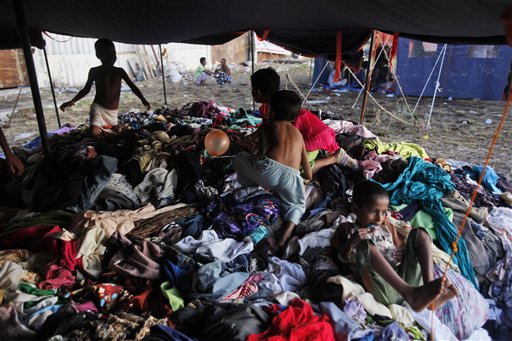
Ethnic Rohingya children play on a pile of clothes donated by local residents at a temporary shelter in Langsa, Aceh province, Indonesia, Monday, May 18, 2015. Boatloads of more than 2,000 migrants — ethnic Rohingya Muslims fleeing persecution in Myanmar and Bangladeshis trying to escape poverty — have landed in Indonesia, Malaysia and Thailand in recent weeks. AP
Sending rescue boats to help the Rohingya Muslims or the “boat people” could be a good gesture on the part of the Philippine government, Justice Secretary Leila de Lima said on Tuesday after her meeting with a representative of the United Nations High Commissioner for Refugees (UNHCR).
“It would be a good gesture if we send a rescue ship or two along with other Asean (Association of South East Asian Nation) neighbors and it should be a concerted effort, a regional action,” De Lima said.
However, she clarified that whether the country would send rescue boats or not should be decided by “government officials at the highest level.”
“We can only suggest to the decision-makers; this will probably be at the highest level … Humanitarian consideration should transcend any other considerations and the priority now is to be able to save lives,” De Lima, former chair of the Commission on Human Rights (CHR), said.
While the Philippines is not affected by the migration of the boat people, De Lima said the country should not sit idly and do nothing.
The Philippines is a signatory to the 1951 Convention Relating to the Status of Refugees and the 1954 Convention Relating to the Status of Stateless Persons, she said.
She said the Department of Justice had a mechanism in place for assisting asylum seekers.
Bernard Kerblat of the UNHCR said a collective approach among countries was needed to address the problem.
“What are we saying, in a very humble way, [is] let’s join forces; let’s look at what can be done collectively, and its not a responsibility alone for Thailand or Bangladesh or Myanmar or Malaysia or Indonesia. It’s a responsibility which falls on all the affected member-states and much more. We need the rest of the world,” Kerblat said.
RELATED VIDEOS

